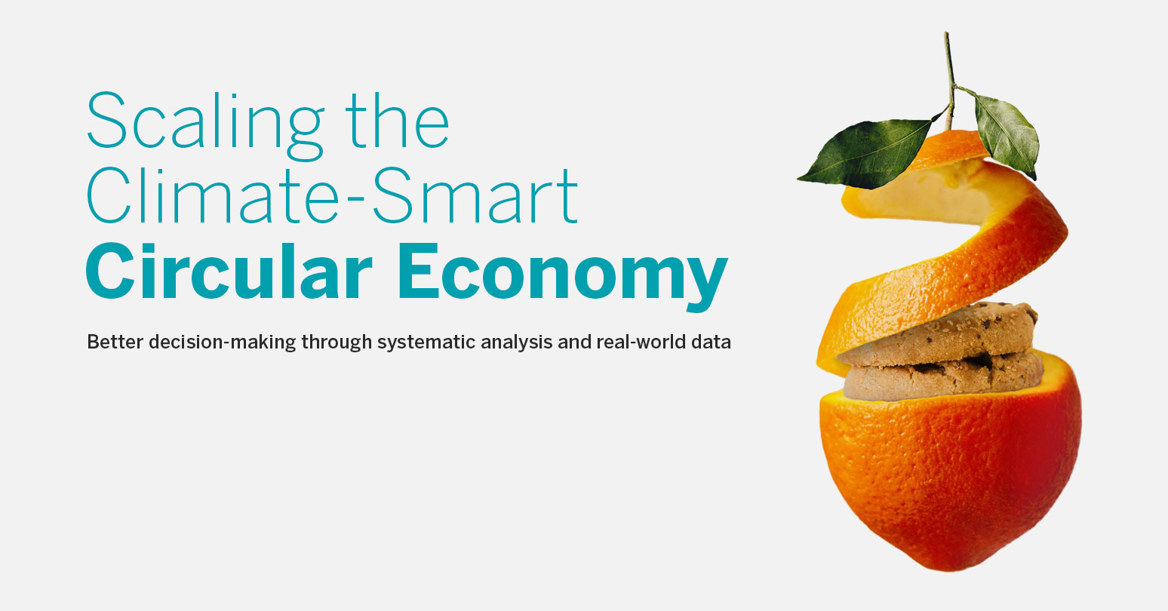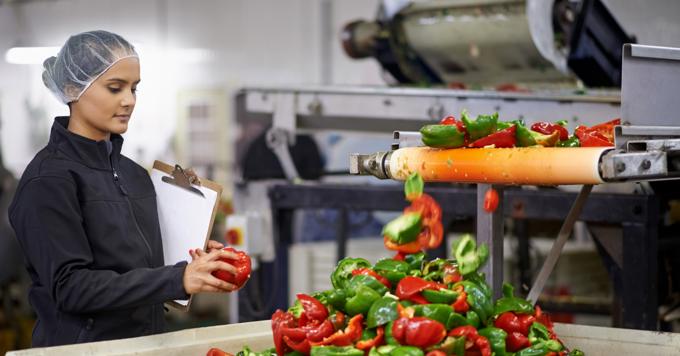The circular economy - conserving materials and avoiding waste through closing material flows - can be a key approach for reducing greenhouse gas (GHG) emissions, and will be an important strategy for Canada to meet its 2030 Emissions Reduction Plan. This especially applies in the agri-food sector, responsible for almost 100 million tonnes of CO2 equivalent emissions per year in Canada, in which 60 per cent of production is currently wasted with an economic loss of $50 billion annually.
The big question for businesses and policy-makers: what are the best solutions and policies that optimize the use of resources to aggressively reduce carbon emissions?
A landmark study, Scaling the climate-smart circular economy, conducted by researchers at the Ivey Business School’s Centre for Building Sustainable Value (BSV), tackled this question through examining two Canadian “hot spots” for circular innovation in the agri-food sector - the Guelph-Wellington (Ontario) and Montreal (Quebec) regions. The multi-year study analyzed over 110 “waste exchanges,” in which one firm took the food waste from another firm for an intended beneficial use.
These firms represent a rapidly growing ecosystem of innovators using circular approaches to capture the economic value in otherwise “wasted” materials and resources, often through the “upcycling” production of new food products. Examples of “upcycling” included utilizing wet spent grain (a by-product of brewing), or fruit and vegetable residues (leftover material from canning and juicing) to produce high-value ingredients and consumer products such as cookies, crackers, edible flours, and flavourings.
The Ivey study reveals that existing upcycling operations for food waste can reduce emissions by up to 25 per cent, as compared to production using virgin materials. Even higher emissions reductions are achieved when waste is diverted from landfills. Upcycling, designed according to the recommendations in this report, represents an important near-term strategy for making significant progress to climate goals.
The Ivey research provides insights for businesses and policy-makers on practical measures to advance and support the real-world growth of the climate-smart circular economy, including:
- Being local matters - Supporting the development of local circular economy clusters – ideally keeping production and materials transportation within 300 km – will significantly reduce the carbon footprint of our food products while also fostering operational coordination and knowledge exchange;
- Innovation and technical advice - Fostering innovation and facilitating access to relevant technical advice could be valuable for guiding circular economy entrepreneurs to make climate-smart choices in their processing investments. Seemingly small operational decisions can have important implications for our climate. For example, mechanical pressing of wet spent grain and fruit and vegetable residues before transporting, drying and milling significantly reduces energy use and associated carbon emissions in transportation and subsequent processing;
- Develop data and mapping tools - Promoting the availability of key data, especially the location of waste generation, the volume of potentially reusable “waste” materials, energy consumption during waste processing, and the quantity of recovered resource for different waste streams;
- Promote usage of life cycle assessment (LCA) analysis – LCA, which considers the whole production system, is an essential tool for building “win-win” solutions. In the case of the agri-food sector, it helps evaluate the full benefits of upcycling by also calculating the environmental benefits of avoiding the use of “virgin” ingredients.
“As the circular economy builds momentum, and with firms making major investments and policy-makers shaping policy frameworks, it is critical that decision-making is well-informed to drive outcomes that are both circular and climate smart. We must provide more evidence-based guidance to help design and manage circular processes that yield net environmental benefits,” said Ivey’s Associate Professor Jury Gualandris and lead author of the study.
Two innovative Guelph-based initiatives are key partners in this research. In 2019, the City of Guelph and Wellington County launched a bold plan to create a regional circular food economy, Our Food Future, after successfully winning Infrastructure Canada’s Smart Cities Challenge. Early success and strong interest from business and industry led to a sister initiative, Circular Opportunity Innovation Launchpad (COIL), launched in 2021 with funding from the Federal Economic Development Agency for Southern Ontario. With a goal to find new carbon-reduced and environment-friendly methods to make products, use food and manage land, the programs are leading foundational circular economy explorations including supporting this research, helping launch circular start-ups, and guiding living lab demonstration projects.
“In Guelph and Wellington County we have seen strong momentum from food businesses interested in embedding more circular principles in their operations – well above our early estimates, and with promising early outcomes in finding value from waste resulting in new products, new businesses, and collaborations between companies,” said Barbara Swartzentruber, Executive Director, Guelph-Wellington Smart Cities Office. “In addition to creating economic growth and resilience, building a regional circular ecosystem here has created social and environmental benefits, and provided hundreds of businesses with new pathways to fight climate change. Our experience has shown that circular economies and collaborations need to be built in communities. The conclusions in this report are well timed in reinforcing the importance of place and local level collaborations to maximize the social and environmental benefits of the model. As the circular economy movement grows, it will be important that we bring this rigour and precision of this report to our work so interventions and demonstration projects can be designed to reduce emissions to the greatest degree possible.”
The project was also co-funded by the Mitacs Accelerate program and the Social Sciences and Humanities Research Council of Canada.
A next phase of research, called “The Circular Leadership Program”, conducted in collaboration with COIL and Ivey’s Innovation North, is engaging with a large group of SMEs in Ontario to identify key interventions that support climate-smart circular innovations in the agri-food sector.
About the Ivey Business School, Western University
The Ivey Business School (www.ivey.ca) at Western University is Canada’s leading provider of relevant, innovative and comprehensive business education. Drawing on extensive research and business experience, Ivey faculty provides the best classroom experience, equipping graduates with the skills and capabilities they need to tackle the leadership challenges in today’s complex business world. Ivey offers world-renowned undergraduate and graduate degree programs, as well as Executive Education at campuses in London (Ontario), Toronto and Hong Kong.
About Mitacs
Mitacs is a Canadian not-for-profit organization committed to empowering Canadian innovation through effective partnerships that deliver solutions to our most pressing problems. For over 20 years, Mitacs has assisted organizations in reaching their business goals, has funded cutting-edge innovation, and has created job opportunities for students and postdocs. We are passionate about developing the next generation of researchers who will work to fuel Canada’s knowledge-based economy. To find out how our programs could take your research to the next level, visit mitacs.ca.










